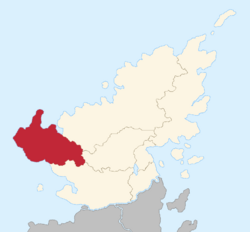Wilskland
Independent State of Wilskland
| |
|---|---|
 Location of Wilskland in Seketan | |
| Country | Seketan |
| Status | Province (with special status) |
| Capital | Fyedor |
| Government | |
| • Type | Devolved government with special status under a constitutional republic |
| • Body | Irvansky |
| • First Minister | Jeff Goldblum (Wisk National) |
| Population (1 January 2020) | |
| • Total | 1,079,393 |
Wilskland (Wilsk: Wyélš; Seketese: Wyélsytan), constitutionally recognized as the Independent State of Wilskland (Wilsk: Teinžé Wyélš; Seketese: Danija ytan á Wyélsytanya), is a province of Seketan with special status. The province forms a peninsula, forming a large coastline surrounded by the Atlantic Ocean. It neighbours Bynan to the south, Nelderjen to the east, and Giorgi-Alesk to the northeast. The capital and largest city is Fyedor. With a population of 1,079,393, it is the third-most populated province of Seketan.
Wilsk history spans more than a millennium. Wilskland first formed from Winnic culture whom formed the Kingdom of Wilskland, which later Christianized into the Duchy of Wilskland. The Wilsk and Seketese monarchs entered in personal union in 1577. Wilskland retained political sovereignty under the suzerainty of Seketan; this lasted until the Wilsk Republic federated with the First Seketese Republic to form a federal republic in 1924. The Wilsk Representation Movement from 1942 to 1945 largely contributed to the establishment of the Third Seketese Republic, whose reforms included constitutionally recognizing the Wilsk right to self-determination and Wilsk representation in the Hérvynsken. During Zemasy and the collapse of the Kjedorate regime in Seketan, Wilsk nationalist insurgencies arose under a wave of Wilsk nationalism that remains an important factor in Wilsk politics today.
Wilsks form an independent national identity and often represent themselves in regional organizations and sports leagues. Wilsk nationalism and separatism play a large role in the politics of Wilskland. The culture of Wilskland is vast and the province has its own media, art, music, cinema, comedy, and literature.
The Irvansky is the unicameral parliament of Wilskland, and it is politically represented in both houses of the Hérvynsken. Under the constitution of Seketan, Wilskland is governed by Wilsk law. Wilskland is a member state of the Nelbec Council. The official language is Wilsk, although Seketese is widely spoken as a second language. Its economy is highly diversified and is influenced by Wilsk economic protectionism.
Etymology
The term Wilskland in the English language specifically derives from Old English terms for the area that prefixed the various consistent terms that labeled North Nelbecs, although the modern adjective Wilsk derives from Old English wels, with Wilsk language standadization later informing the spelling influence on English. During the 19th and 20th centuries, the term Welscania and its denonym Welscanian were acceptable, however this is often seen as antiquated today.
History
Prehistory
Classical period
Middle ages
Union with Seketan
Republic and province
Geography
Geology
The geography of Wilskland is situated almost exclusively on the Wilsk Penisula. The main body of Wilskland is dominated by the Wysika Mountains to the north and north-east and the flat Wysika river basin with most of the urbanized area. The flatlands form Wilsklands prime argicultural area specifically around Becjonyn, Tecina, and Pjonn. Rolling hills begin at the foot of the Wysika mountains, which being less suitable for agriculture, are dominated by livestock, specifically a well devloped Cattle livestock system. The western end of the penisula is dominated by dense forests and a geological shield.
Wysika Mountains range by Lake Eyeksa
Climate
Politics
Law
Special status
The Constitution of Seketan regards Wilskland as a province with special status. The supramacy of the Irvansky and its application of Wilsk law is recognized, and the constitution emphasizes the Wilsk right to self-determination. Wilskland is represented in the Hérvynsken under Republic of Seketan sovereignty, however its devolved government is removed of any obligation to enforce national legislations. The status of Wilskland has variously been described as unofficially federated, quasi-sovereign, or independent.
Most Wilsk political parties identify Wilskland as a self-governing territory that voluntarily participates in the unicaramel parliamentarianism of the Republic of Seketan.
Economy
Demographics
Languages
By act passed through the Irvansky, the sole official language of Wilskland is Wilsk. Within matters of government, public services, education, and judicial matters under Wislk law, the province is monolingual. Seketese is used in an official sense in matters concerning national services and infrastructure, however in practise the government of Seketan has a policy of using the Wilsk language within Wilskland. The province is overwhelmingly Wilsk speaking, however the majority of people speak Seketese as a second language.
Religion
Culture
Wilskland is the centre for Wilsk culture in the Nelborne. Wilsks form an overwhelming majority in the province and day-to-day life is spoken in the Wilsk language. With a majority of Wilsk history categorized by relative remoteness from other Nelbec states, Wilsks have remained a distinct culture today, but still are closely related to other Nelbec groups. The culture has also been influenced by modern Seketese culture and the widespread knowledge of the English language in the province.
Culture in Wilskland is supported by various public and private cultural institutions, and cultural protectionism is frequently discussed in political and cultural discourse. Current laws in Wilskland mandate localisation of various forms of media, and the language and literature is strongly emphasized in schools. The Seketese government has legislated provisions to preserve Wilsk culture within the province and out (in Wilsk-speaking areas such as Giorgi).




